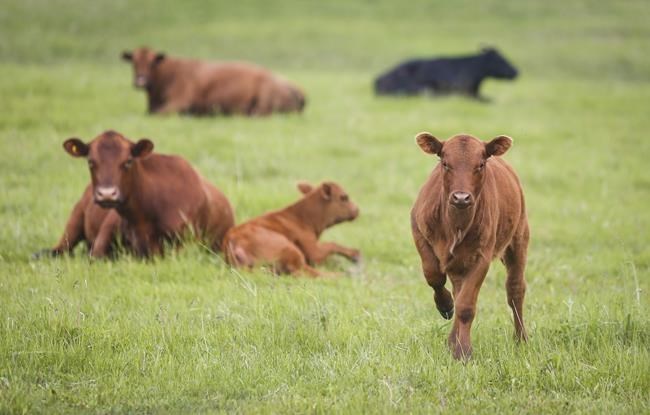CALGARY — If the train that Leighton Kolk has been waiting on doesn't arrive by noon Sunday, the Iron Springs, Alta.-area feedlot operator says he won't be able to feed his cattle.
Kolk has been waiting for days for Canadian Pacific Railway Ltd. cars to roll in with a shipment of corn from the U.S.
"The train was supposed to arrive Tuesday and it's still not here and now it's Friday morning. If it doesn't arrive soon, we’ll have to have people out shovelling and scraping the bin bottoms," Kolk said.
"In 30 years of business, I’ve never experienced where we don’t know what we’re going to feed the cattle Monday morning.”
An unprecedented situation is unfolding in Canadian cattle country, where industry groups say a widespread feed shortage has escalated in recent days to a full-fledged emergency.
“We’re at the crisis stage now,” said Canadian Cattlemen's Association president Bob Lowe, who said his own feedlot near Nanton, Alta., will be out of feed by mid-next week.
"Nobody wants to look at a bunch of cattle starving to death around their operation. We don’t want that, and we’ll do anything to keep that from happening, but this could become an animal welfare issue."
Feed supplies have been a concern in the cattle industry ever since last summer, when extreme drought left Western Canada with low supplies of hay and other feed grains. Many cattle producers have resorted to importing large quantities of corn from the U.S. to get their animals through the winter.
However, in recent weeks the problem has been exacerbated by transportation challenges. According to the Alberta Cattle Feeders' Association, an industry group that represents feedlot operators in the province, 75 per cent of its members report experiencing delays receiving expected rail shipments of corn since the start of the year.
Many are growing increasingly desperate. Several large feedlot operators expect to run out of animal feed "within days," said Janice Tranberg, president and chief executive of the Alberta Cattle Feeders' Association.
"I'm not sure some people understand the magnitude of the situation," Tranberg said. "These feedlots house anywhere from 20,000 to 40,000 head, so this is dire."
It is very unusual for Canada to import large quantities of agricultural feed corn from the U.S., with 2002 being the last year it happened in significant volumes (also because of drought).
On Friday, Canadian Pacific chief financial officer Nadeem Velani said his company moved more than 8,100 carloads of corn into Alberta in 2021, compared to just 600 carloads the year before — adding that the unprecedented demand required the creation of facilities and a supply chain that didn't previously exist.
But Velani acknowledged that CP Rail has also been challenged by a number of issues this winter, including the Omicron variant and an increase in the number of employees out sick as well as extreme cold that has forced the company to run shorter trains and at reduced speeds.
"We have seen some challenges as well with customer labour shortages, and what that's meant in terms of loading and unloading at some of the customer facilities where they've been short-staffed," Velani said at the CIBC Western Institutional Investment Conference.
In an email, CP spokeswoman Salem Woodrow said the Calgary-based railway is "committed to servicing our customers and playing a role in enabling feed to be supplied to feedlots during this challenging crop year."
But in agricultural circles, frustration is mounting.
"They blame COVID and weather, and in my opinion those are two fairly valid excuses, but in the feeding industry we suffer through COVID and weather too but we still have to feed the cattle," Lowe said. "CP Rail does not seem to understand that the cattle need to be fed.”
For his part, Kolk — the Iron Springs producer whose bins are nearly empty — said he had firm contracts in place with U.S. suppliers for a train-load of feed corn to be delivered each month between November and April. So far, he's only received one-and-a-half of his anticipated shipments.
He said many of his neighbours are in a similar boat, and everyone is trying to help each other out and conserve what corn is left in the area.
"It's, 'how much do you have, how much do you need, can I take a couple of loads from the next train even though it's not my train?'" Kolk said.
"The last time we were almost out and the train finally came in, my staff went and worked an 18-hour shift all through the night just to get the bins refilled."
If he runs out of feed, Kolk said he will be forced to put his cattle on reduced rations.
"It would be like if you were used to getting three meals a day and then all of a sudden the only thing we have to feed you is dry Rice Krispies or something," he said.
"It's going to cause health issues, because you can't just go and change an animal's diet like that."
This report by The Canadian Press was first published Jan. 21, 2022.
Amanda Stephenson, The Canadian Press



